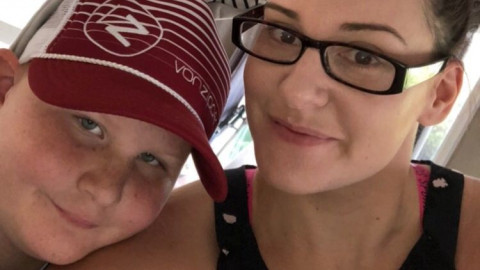
The mother of a disabled boy who has severe behavioural issues is pushing for better skills and standards after settling a discrimination lawsuit with a Victorian support provider.
Key points:
- Emily Dive took action against Mansfield Autism Statewide Services, which cared for her son, Lachlan Murrell, in 2017, for causing him trauma
- Initially, the Australian Human Rights Commission took up the case but the matter went to the Federal Court when the parties could not agree
- The boy also lives with PTSD, ADHD, separation anxiety and oppositional defiant syndrome
Emily Dive took action against Mansfield Autism Statewide Services, which cared for her son, Lachlan Murrell, in 2017, for causing him trauma.
Lachlan was nine at the time and attended an off-site camp run by MASS and, on occasions, also lived at its facilities.
It also provided services at the family's home.
Boy had 'behavioural issues'
Ms Dive's claim was on the grounds the agency had discriminated against the boy, based on his disability.

Nine-year-old Lachlan Murrell has autism.(Supplied: Emily Dive)
Lachlan is on the autism spectrum and also lives with PTSD, ADHD, separation anxiety and oppositional defiant syndrome.
His behavioural issues included self-harm, kicking, screaming, absconding and spitting.
Initially, the Australian Human Rights Commission (AHRC) took up the case but the matter went to the Federal Court when the parties could not agree.
The AHRC complaint said MASS used inappropriate restraint, even resorting to violence on at least 20 occasions in the seven months Lachlan was using MASS services.
The AHRC action was taken up in the Federal Court case and outlined the failure of MASS to live up to its advertising to use "evidence-based services, services based on best practice, research-based approaches, and to provide a proven and sustainable model of excellence".
"Rather than provide such services, Mansfield used physical restraint and seclusion repeatedly, causing trauma to Lachlan," Ms Dive wrote in the initial AHRC statement of claim.
MASS denied any discrimination.
'No adverse findings' against MASS
In her ruling last week on Ms Dive's civil claim, approving the confidential court settlement, Justice Debra Mortimer noted MASS "admitted that on some occasions Lachlan was subject to "temporary seclusion" and restraint, which it maintained was used as a "last resort" and was required because of Lachlan's behaviour, in order to protect his own health and safety and that of others."
Justice Mortimer approved what she described as a "relatively modest" settlement sum.
In a statement provided to the ABC, Mansfield Autism Statewide Service said it was pleased the litigation had ended.
"There have been no adverse findings against our organisation and we will continue to deliver high-quality, best-practice services to autistic children and their families," the statement read.
"We have a proud reputation for supporting families for over 50 years."
Put into wooden box
In 2017, Ms Dive took separate legal action against Victoria's Education Department claiming a state-run primary school had placed Lachlan in a wooden box to deal with his behavour.
The matter was settled out of court.
Ms Dive said she was limited in what she could say about the latest case, but that she was pleased with her son's recent progress.
"Lachlan has shown great resilience throughout his experiences, and I am for the first time excited for what his future looks like," Ms Dive said in an email to the ABC.
"He has a great set of skills and strengths that are finally being acknowledged which has assisted him in the improvement that he is making.
"It's not an overnight miracle story, but Lachlan is currently doing really well."
Ms Dive has been assisted by disability advocate Julie Phillips, who has been critical of the lack of expertise of Mansfield staff in dealing with people with "severe behaviours".
"Unfortunately, there are still many organisations that believe repeated restrictive practices are appropriate and necessary," she said.
"This is usually because they don't have credentialled behavioural experts working for them."
from https://www.abc.net.au/news/2020-07-14/victorian-autism-services-adhd-p…